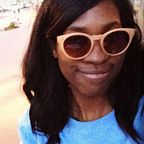Was this the Blackest week in culture ever?
Here’s what’s in our eyeballs and earholes this week
Solange Knowles invites us to have “A Seat at the Table”
Don’t tell Bey, but Solange is secretly my favorite Knowles. With her newest album “A Seat at the Table,” Solange creates a piece of art that sounds like a love letter to Black women everywhere. (If you haven’t seen the video for Don’t Touch My Hair, go ahead and open this in a new tab).
Here’s why Ezinne Ukoha says “A Seat at the Table” arrived just in time:
Lemonade was the blueprint for Black women in search of biblical validation. A Seat at the Table arms us with the weapons of astute discovery in the eyes and arms of the men — who love us in the midst of our self-acceptance and worldly defiance.
Started from YouTube now we’re here
Viewers got a sneak peak at Issa Rae’s highly anticipated new series “Insecure” on HBO this weekend. Based on her hit YouTube series Awkward Black Girl, Insecure tells the story of an awkward Black 29-year-old trying to figure out adulthood. Bradshaw w/ Melanin sums it up:
If chicken soup for the melanin-filled millennial soul had a face, it would be Insecure.
Does the fact that HBO greenlit “Insecure” mean that Hollywood will finally see Black women as the complex, multidimensional humans that we are? The folks over at Women and Hollywood hope so:
We hope it’s true that HBO is enthusiastic about Rae bringing newer and fresher voices on board, since the network has an abysmal track record of hiring women writers and creators of color. We know that viewers do need not be hand-held by a white male center or point of view; audiences can relate to any character or situation if a story is told well enough. (Hello, the most popular show in HBO’s history involves dragons.) Also, the new trend in TV — following the astronomic success of “Empire” and the takeover of ABC by Shonda Rhimes — is supposed to be diversity. So many viewers want something different, something that speaks to them, even if it doesn’t mimic their own exact experience.
Welcome to Atlanta
Donald Glover’s highly anticipated FX show “Atlanta” might be the Blackest thing on television right now, but it’s careful not to rely on stereotypes (except the ones that are kind of true) opting instead for a fuller depiction of Black identity. mauludSADIQ breaks it down:
With most shows that depict Black people, characters are either weak or strong, good or bad. (I can’t tell you how many times I’ve heard people identify with Micheal of The Wire or Olivia Pope of Scandal all the while holding down a stocking position at Wal-Mart.) Donald Glover has steered away from such easy characterizations. In short, these characters are me, my cousins, friends, and family. Real Black people. And wherever the show is going for the next six episodes, a strong foundation has been laid in the first four that the show could possibly reach something sublime — a word I seldom use — classic.
Speaking of audiences and their thirst for diverse and complex stories, it’s a good time to remind folks that “Atlanta” has proven a ratings powerhouse for FX and has already been picked up for a second season.
Luke Cage and the importance of a bulletproof Black superhero
Netflix’s “Luke Cage” might be one of the Blackest superheroes around. Cage does work in a bulletproof hoodie, and if *that* isn’t Black enough, the series opens with a barbershop debate “about the current state of the Knicks.”
But why a bulletproof hoodie? DK Wright explains:
Ex-con Carl Lucas aka Luke Cage is a walking metaphor from his “hole-y hoodie” to his healing factor. The series attempts transparency of how a police department handles minority areas and themselves. A positive portrayal people of color in lead and supporting roles. A good looking bald brother soul searching to be a better man even if it means sounding corny. Plus showing how repressed traumatic experiences ain’t really ain’t all that secret. But why be bulletproof? Well how many stories were cut short because they weren’t?
Michael Norton Dando explains why it’s so important that Luke Cage taps into cultural and political Black identity:
Part of the brilliance of Luke Cage’s story is that it has grown, developed, and changed to fit — and perhaps reflect — the surrounding social, political, and cultural context. While this story is not a Black Lives Matter story per se, black lives indeed matter very much and are inseparable from the character and his meaning. Certainly Black Art from Langston Hughes, James Baldwin or Richard Wright has centered the importance of Black life and existence. About demonstrating humanity and spotlighting the significance of an often unheard perspective. Though he may fight foes in garish costumes and spout catchphrases including the infamous “Sweet Christmas”, Luke Cage is a continuation of this artistic and literary tradition and of no less importance.
BONUS: Speaking of Black culture, Medium Politics spent a day at the newly opened African American History Museum here in DC.
